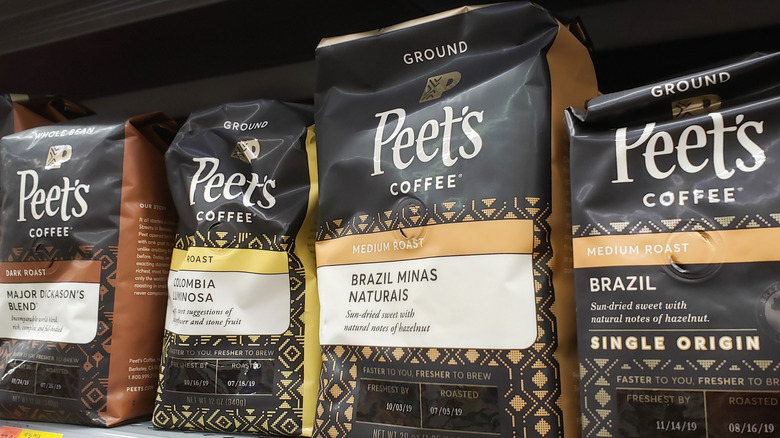Alfred Peet's Empire Was Kickstarted By America's 'Lousy' Coffee
When Alfred Peet moved from London to San Francisco in 1955, the quality of American coffee wasn't great — at least in his opinion. This was only about a decade after WWII brought about the invention of the Americano and about 30 years before the latte's popularity skyrocketed in the U.S., And although the bricks of Seattle coffee culture were first laid in 1895, even 50 years later, it wasn't the booming business it is today.
Peet was a major player in the world of American coffee as we know it. Besides being known as the "grandfather of specialty coffee," according to The New York Times, his company, Peet's Coffee, became one of the most significant java brands in the world. In 2019, Peet's Coffee made a whopping $983 million in gross revenue. And according to Jerry Baldwin, one of the founders of Starbucks, Peet was a big inspiration for the chain's creation.
But what later became a multimillion-dollar empire was born out of Peet's frustration with American java. According to Peet's Coffee, his exact complaint was, "I came to the richest country in the world, so why are they drinking the lousiest coffee?" So in 1955, he embarked on a mission to introduce high-quality coffee to the country via his own shop.
Alfred Peet introduced Americans to a quality dark roast
Growing up in the Netherlands in the 1920s, coffee was in Peet's blood. He was the son of a roastery owner and grew up helping his dad by cleaning machines and performing various other tasks. As an adult, his education in the industry continued — Peet apprenticed for Lipton's Tea and learned the process of tea production in Indonesia. By the time he landed in California in the 50s, he had decades of coffee and tea knowledge to draw upon. So when he tasted America's subpar java, he felt obliged to introduce its people to the dark-roasted Indonesian coffee he had grown to love.
Following the austerity of the Great War and the Great Depression, Americans had gotten accustomed to drinking coffee made from inferior beans. Peet, who had seen the same thing happen when he lived in Europe, realized that an entire generation of people had never tasted the good pre-war stuff. As Alice Waters, legendary owner of the Berkeley restaurant Chez Panisse told NYT after Peet's passing, "[Before him] everybody was drinking coffee that came out of a can."
When Peet opened his first coffee shop in Berkeley in 1961, he emphasized high-quality beans, sensory analysis, and a closeness between the barista and the customer. In doing so, he permanently changed coffee standards in the U.S. — and introduced us to a decidedly non-lousy cup of joe.

